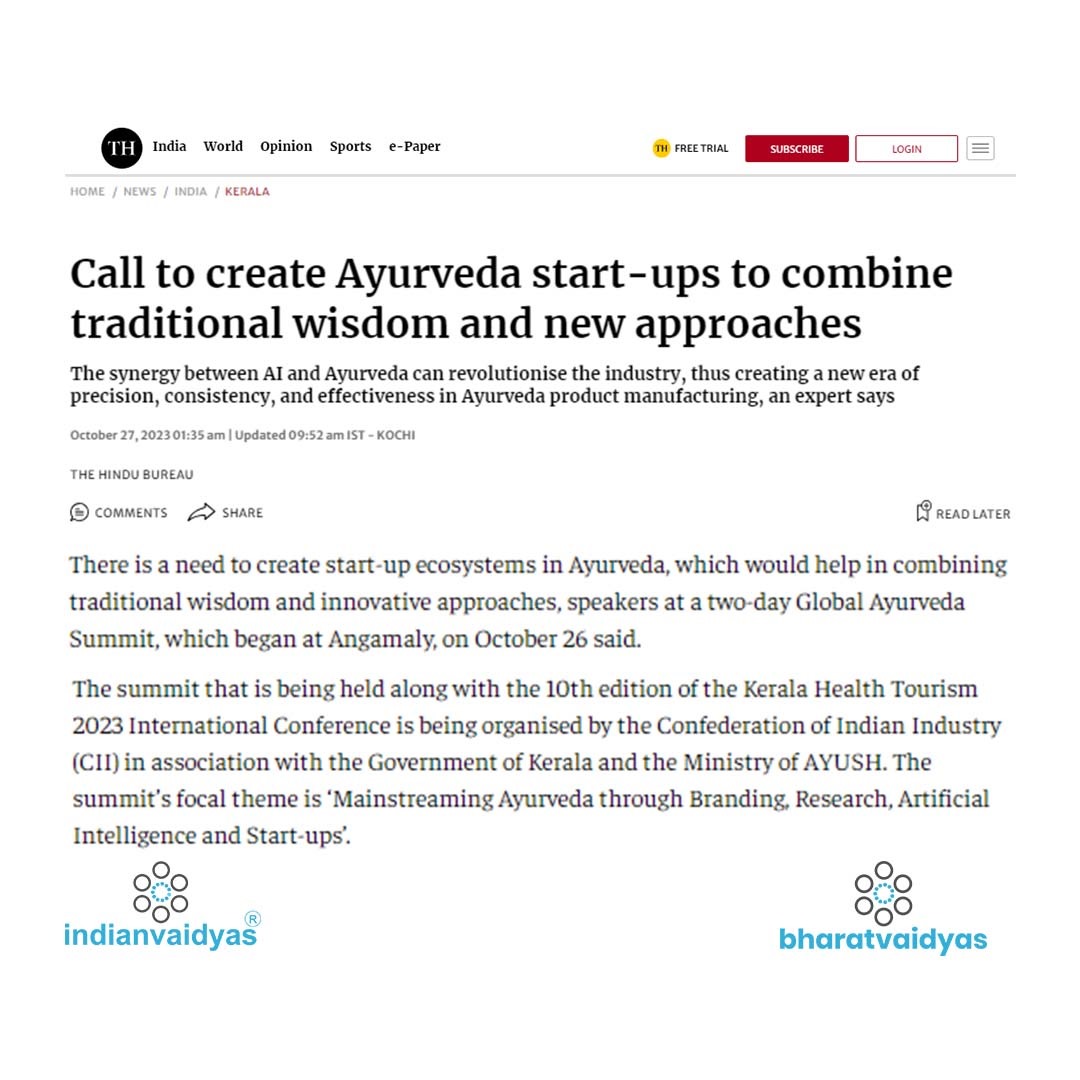Call to create Ayurveda start-ups to combine traditional wisdom and new approaches
27-Oct-23 04:50:56

The synergy between AI and Ayurveda can revolutionise the industry, thus creating a new era of precision, consistency, and effectiveness in Ayurveda product manufacturing, an expert says
There is a need to create start-up ecosystems in Ayurveda, which would help in combining traditional wisdom and innovative approaches, speakers at a two-day Global Ayurveda Summit, which began at Angamaly, on October 26 said.
The summit that is being held along with the 10th edition of the Kerala Health Tourism 2023 International Conference is being organised by the Confederation of Indian Industry (CII) in association with the Government of Kerala and the Ministry of AYUSH. The summit’s focal theme is ‘Mainstreaming Ayurveda through Branding, Research, Artificial Intelligence and Start-ups’.
Inaugurating the summit virtually, former Kenyan Prime Minister Raila Amolo Odinga was all praise for Ayurvedic practitioners in Kerala and recounted that his daughter, who had faced aneurysm, and had been partially blind after a surgery, regained her sight following treatment at an Ayurveda eye hospital in the State. This was after his daughter was taken to Israel, China, and Germany for treatment, but without any success.
“The skill, expertise, and holistic approach of the hospital’s treatment not only saved her life, but also greatly improved her overall well-being. This experience instilled in me profound respect and trust in Ayurveda,” he said and stressed the need to foster partnerships between India-based Ayurveda practitioners and health service providers in Africa.
Dr. Ahmed Mohammed Obaid Al Saidi, former Oman Minister of Health, said in his online address that Kerala was a well-established health hub where people from over 50 countries came seeking treatments. The scope for cooperation between Oman and India in this field was huge, he said, adding that affordable healthcare was the best way forward.
Dr. S. Sajikumar, managing director, Dhatri Ayurveda Private Limited, spoke of how Ayurveda meant business as well. The value of AYUSH products has seen a steady growth from $18 billion in 2020 and is expected to reach $24 billion this year. There is a need to create start-up ecosystems in Ayurveda and AyurTech by combining AI and genomic technologies to achieve evidence-based Ayurveda solutions. The synergy between AI and Ayurveda can revolutionise the industry, thus creating a new era of precision, consistency, and effectiveness in Ayurveda product manufacturing, he added.
Dr. Marthanda Pillai, chairman and managing director of Ananthapuri Hospitals and Research Institute, Thiruvananthapuram, said Tamil Nadu attracted around 50% of medical tourists arriving in the country, followed by Maharashtra and the National Capital Region. “Kerala with a market share of 5 to 7%, medical tourists can easily capture a 10 to 15% of the estimated market by 2030,” he said.
Former Indian Ambassador Venu Rajamony spoke of how a few places in the world had the kind of global linkages that Kerala had, and that the State should take advantage of this. “The world is diverse, and the American, European, African and Asian markets are all different. We need to understand the world in its diversity, do our homework, understand the areas where we are deficient, and learn from the best cases to know what we need to attract many more medical value travellers than we do today,” he added.
Dr. P.M. Varier, chief physician and trustee of Arya Vaidyasala, Kottakkal, said branding set quality standards which were key to entrepreneurship.
Patients from Bangladesh
Speakers said very few were aware that Bangladesh contributed the largest share of India’s health tourism sector — more than 30% of the patients and approximately 50% of the revenue. Despite Kerala’s reputation in medical value travel and its strength in Ayurveda, Kerala has not lived up to its potential in tapping this market, they said. Dr. A.K.M. Atiqul Haque, Minister (Commercial) of the Bangladesh High Commission, said Kerala ought to hold sustained promotional activities in Bangladesh to attract medical value travellers from there to the State.
SOURCE & CREDIT: THE HINDU